BeDental will share with you the necessary information to help you answer the question: “Is it safe to swallow dentures. How to se dentures safely and effectively.
Causes of swallowing dentures
Causes of swallowing dentures ? The concern of swallowing dentures is a common worry for many patients with missing teeth who want to get dentures for aesthetic restoration. Nobody wants this to happen, but for various reasons, dentures can accidentally fall into the stomach.
It is known that the situation of swallowing dentures can happen to both natural teeth, dentures, and adults or children. If natural teeth fall into the stomach, it is usually because the teeth were loose or a baby tooth was broken due to accidentally biting on food and swallowing it. As for dentures being swallowed, the causes can be:
- The process of chewing and swallowing soft food can cause dentures to stick and be carried down into the stomach along with the food.
- Not removing dentures during oral hygiene routines before eating or going to bed can cause them to become loose and be swallowed.
- After a period of use, dentures can become loose, easily fall out of the mouth, and cause you to accidentally swallow them while eating.
- Getting dentures from an unreliable and low-quality dental clinic, where the quality of the dentures is not guaranteed and they do not fit securely in the mouth, can cause them to easily fall out or be swallowed while eating and drinking.
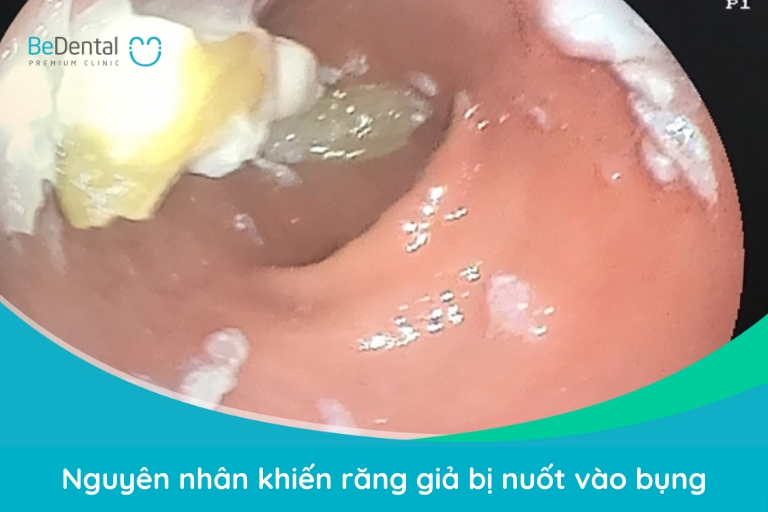
Is it safe to swallow dentures?
Swallowing dentures into the stomach is a concern that receives a lot of attention from customers. Not only those who currently wear dentures, but also those who plan to get dentures for aesthetic restoration are worried about this issue. So, is it really dangerous to swallow dentures?
To provide the most accurate and detailed answer, the dental experts at BeDental have discussed the issue of swallowing dentures into the stomach as follows: If carelessly swallowed, dentures can cause serious problems.
It is evident that in most cases of swallowing dentures into the stomach, there are issues of obstruction in the esophagus and trachea, making it difficult for patients to breathe and swallow. If not promptly treated, it can lead to respiratory failure and directly affect human life. In addition, when dentures have fallen into the stomach, there is a risk of puncturing the stomach, leading to gastric bleeding.
In Vietnam, there have been several recorded cases of swallowing dentures into the stomach. For example, patient Đ accidentally swallowed dentures, which punctured the sigmoid colon, and patient T swallowed three dentures but luckily received timely treatment, thus not affecting their life.
According to statistics published in national journals and American surgery publications, up to 8% of swallowed dentures end up in the lungs and directly harm the stomach. Therefore, you should be aware of the risks of swallowing dentures into the stomach and consider it a medical emergency. Especially when swallowing dentures is accompanied by the following symptoms:
- Difficulty swallowing.
- Neck and chest pain.
- Repeated vomiting.
- Appearance of blood in vomit or stool.
- Severe abdominal pain.
- Fever.
- Continuous diarrhea.
Do dental crowns require anesthesia? The process of getting dental crowns with anesthesia
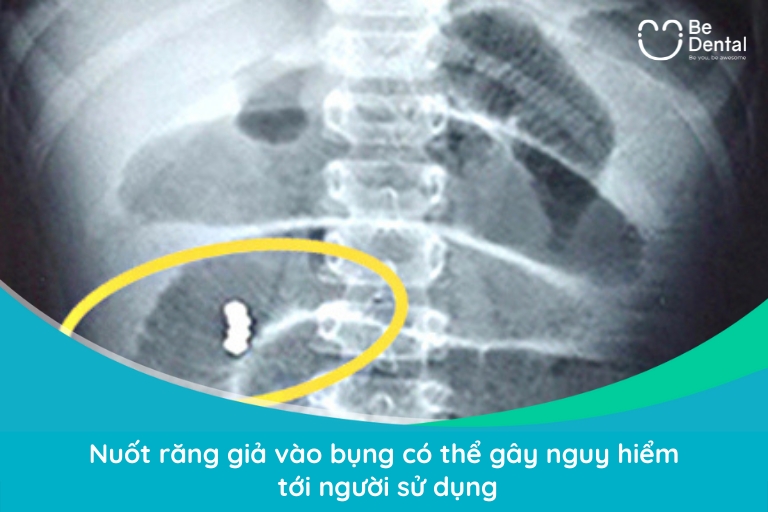
Advice on prevention and solutions for swallowing dentures into the stomach
Instead of worrying about swallowing dentures into the stomach, you should focus on prevention and solutions in case it happens. Here are some tips to help you minimize the risk of swallowing dentures and effective ways to address the situation:
Preventing dentures from falling into the stomach
- Limit consumption of sticky, hard, or chewy foods.
- Eat slowly, chew thoroughly before swallowing.
- Remove dentures when sleeping.
- Regularly check and replace loose dentures.
- If you choose to get dentures, prioritize finding a reputable dental clinic to ensure high-quality restoration. Well-fitting dentures are less likely to fall out while eating, reducing the risk of swallowing them.
- Consider implant-supported dentures to eliminate the risk of swallowing dentures. Compared to removable dentures, dental implants provide a much more secure fit.
What is an implant-supported removable denture? Is it truly worth using?
Note: For cases involving the transition from baby teeth to permanent teeth in children, you should teach them how to safely remove loose teeth. Additionally, remind them to be cautious with food when their teeth are loose.
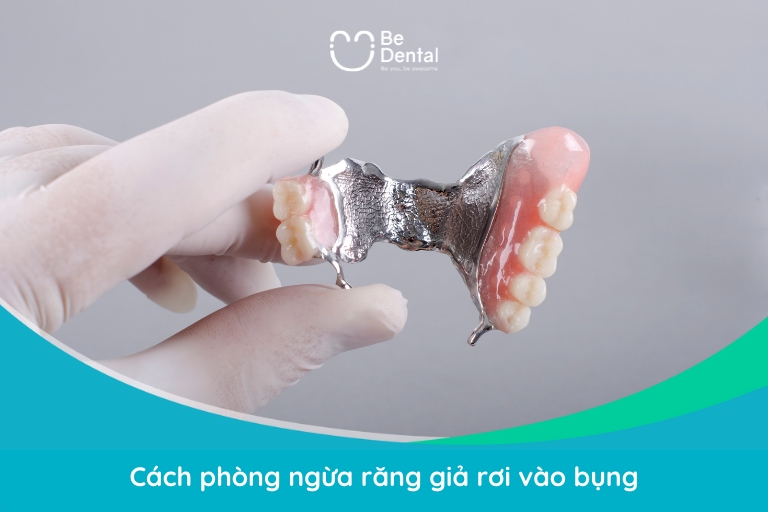
How to address the situation when dentures fall into the stomach
If you accidentally swallow dentures into the stomach, don’t panic. Stay calm to handle the situation promptly and prevent further complications. Here are the actions you should take after swallowing dentures:
- Observe your stool: Since dentures usually pass through the digestive tract with food, carefully observe your stool to see if the dentures come out this way.
- Monitor any unusual symptoms in your body. If you experience severe abdominal pain, vomit blood, etc., do not ignore these signs.
- Ideally, you should visit a doctor immediately for a thorough health check-up. The longer you wait, the higher the risk of severe complications that can affect your life. If you choose to wait and see if the dentures come out naturally with your stool, the maximum waiting time should be 12-14 hours, and it is not advisable to wait too long.
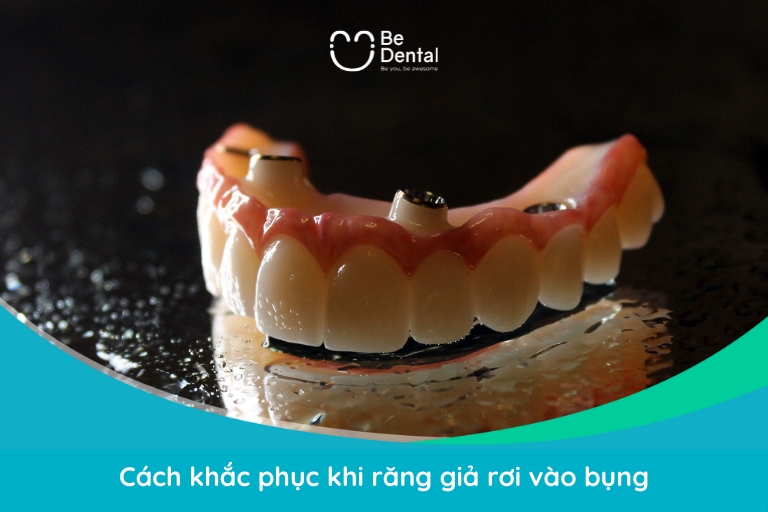
Why do dentures need to be removed during surgery?
Besides the concern of swallowing dentures into the stomach, many patients also wonder why dentures need to be removed during surgery. In fact, the problem of swallowing dentures while sleeping is quite common. Especially during anesthesia, when the patient is unconscious, dentures can still be swallowed into the stomach.
In reality, cases of dentures being swallowed into the stomach during surgical anesthesia have occurred. Mr. Jack, for example, forgot to remove his dentures before undergoing surgery.
Six days after his successful surgery to remove a benign tumor from his abdominal cavity, he had to be rushed to the emergency room due to multiple issues such as coughing up blood, difficulty swallowing, and intense pain that made it impossible for him to eat solid food.
Because Mr. Jack had a history of lung disease, the doctor believed that the patient had a respiratory tract infection and prescribed antibiotics with mouthwash. However, in the following two days, Mr. Jack experienced more severe symptoms, especially difficulty drinking medication. In addition, he felt shortness of breath, especially when lying down.
Through a new X-ray, a crescent-shaped object was discovered around the patient’s trachea. At this point, the doctor identified the cause and proceeded to remove the dentures from the trachea.
Similarly, cases of dentures falling into the stomach during surgical anesthesia are quite common. Therefore, doctors recommend that all patients using dentures should inform their doctors in advance. If removable dentures are used, they should be removed prior to surgery to ensure safety.
How to Stop Bleeding after Wisdom Tooth Extraction? Some Ways to Control Bleeding
Is it normal to experience pain after denture placement? Causes and solution
Besides the concern of swallowing dentures into the stomach, it is quite common to experience pain after denture placement. This worries many patients who are unsure if it will have any impact.
Causes of pain after denture placement
If you experience persistent pain and discomfort after wearing dentures for a long time, it may be due to one of the following reasons:
Unresolved oral diseases
When getting dentures, any existing oral diseases should be thoroughly treated beforehand to ensure a safe and minimize complications during the denture placement process. However, due to a lack of expertise, some dentists may not detect and address all oral diseases, leading to pain after denture placement. Some oral diseases that need to be treated before getting dentures include:
- Root canal infection: If the tooth pulp is severely inflamed and not fully treated, it can cause necrosis and nerve irritation, resulting in prolonged pain.
- Tooth decay: Bacteria that cause tooth decay can still exist and thrive, causing prolonged pain.
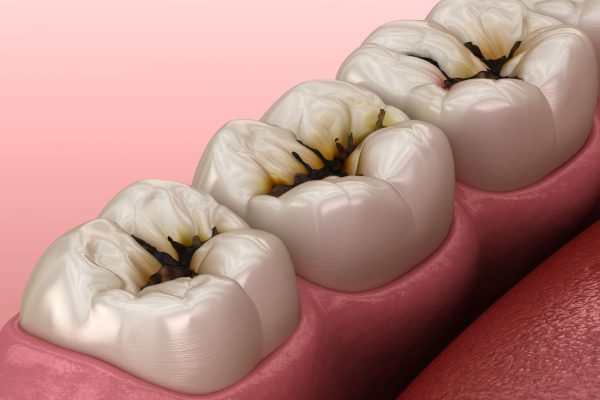
- Gingivitis, tooth impaction: untreated gingivitis or tooth impaction can also cause pain after denture placement.
Weak underlying teeth
Placing dentures on weak teeth can cause pain and discomfort. Additionally, the strong and continuous chewing force can compress the teeth and cause aching sensations.
Inadequate denture fabrication process
Getting dentures from unreliable dental clinics often leads to pain after completion. This is because the dentist may lack skill and may grind down too much of the natural teeth or create ill-fitting dentures.
Inappropriate eating and oral hygiene habits
After getting dentures, eating and oral hygiene habits play a significant role in determining whether there will be swelling, pain, or infection. If these habits are good, you will gradually feel the dentures become compatible with your teeth.
On the other hand, if you don’t know how to maintain proper oral hygiene or eat incorrectly, oral bacteria can proliferate, leading to the development of painful dental conditions.

Ways to alleviate pain after denture placement
To effectively treat the pain after denture placement, you can consider the following methods:
- Use prescribed pain medication from the doctor.
- If the tooth pain is caused by underlying oral diseases, the denture should be removed first, followed by comprehensive treatment of the oral diseases.
- Adjust the porcelain teeth if there are signs of discomfort or impaction.
- If there is discomfort due to an unstable dental crown, consider getting dental implants to resolve the issue. Dental implants are extremely stable and non-invasive, which can help alleviate pain and discomfort.
- Thoroughly clean the mouth, using dental floss and mouthwash for optimal cleanliness.
- When eating, limit hard, tough, excessively hot, or cold foods, as they may negatively affect the dentures.
- Quit smoking.
- Regularly visit reputable dental clinics to check if there are any issues with the dentures. If necessary, intervene promptly to avoid potential complications.
Can dentures be whitened?
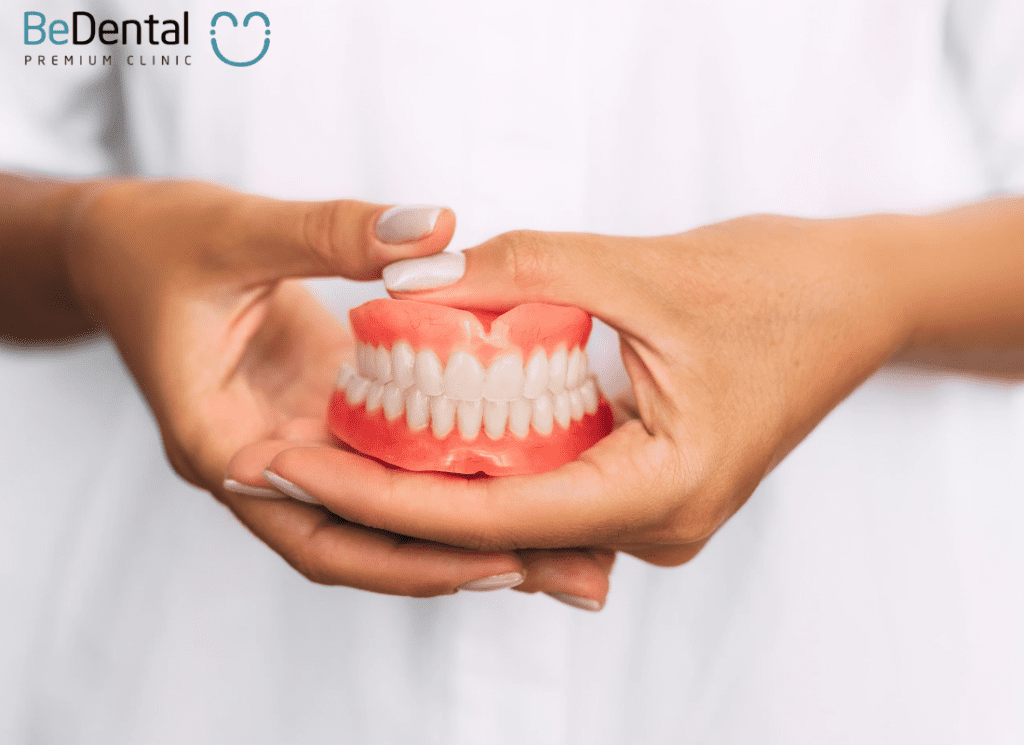
Many patients are concerned about whether dentures can be whitened. Over time, dentures can become yellow or black. With natural teeth, teeth whitening products are the most effective solution. But what about dentures?
In reality, teeth whitening products only work on natural teeth. You should not buy denture whitening products that are widely advertised on the market, as they may be ineffective or even harmful. Also, be careful not to mistakenly purchase fake Eucryl teeth whitening powder.
Furthermore, if dentures are made from pure porcelain, they will not become discolored. You just need to follow good oral care practices, and the porcelain teeth will remain bright and beautiful.
Oral hygiene is quite simple – use a soft-bristle toothbrush to clean and brush your teeth regularly twice a day. Additionally, use a physiological saline mouthwash, dental floss, and limit the consumption of foods with coloring agents.
We hope the information provided in this article has helped you understand whether swallowing dentures is harmful,Can dentures be whitened or not and what the correct approach is. If you have any further questions or need advice on denture placement, please contact BeDental to directly consult with our team of experts.
Tư vấn chuyên môn bài viết:
BÁC SĨ ĐÀM TRỌNG HIẾU
BEDENTAL - TOP STANDARD DENTISTRY SYSTEM
In HANOI
Address 1: 7B Thi Sach St, Ngo Thi Nham, Hai Ba Trung Dist, Ha Noi. - 0934.61.9090
Address 2: No 129 Hoang Ngan, Yen Hoa, Cau Giay Dist, Ha Noi. - 0934.61.9090
In HO CHI MINH
Address 1: 53 -55 -57 Pho Duc Chinh St, Nguyen Thai Binh, Dist. 1, Ho Chi Minh. - 0766.00.8080
Working: 9am - 8pm everyday
Website: https://bedental.vn/en/





